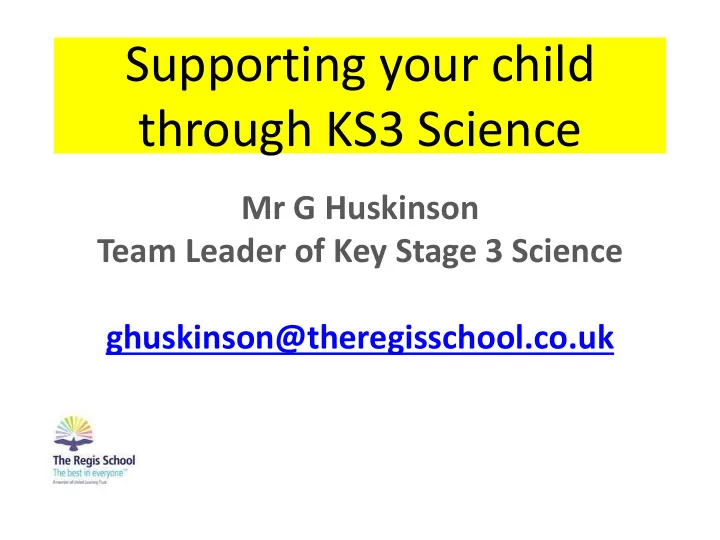

Supporting your child through KS3 Science Mr G Huskinson Team Leader of Key Stage 3 Science ghuskinson@theregisschool.co.uk
The Curriculum Year 7- Passport to Science A successful programme which will give your child the skills and confidence to work safely in a Science lab! • Lab safety • Lab procedures • Scientific equipment • Using equipment
Year 7 Each term at The Regis School will consist of a varied diet of double topics from Biology, Chemistry and Physics. This will be supplemented with practical work and demonstrations (How Science Works-HSW). ❑ Cells and reproduction ❑ Forces and magnets ❑ Energy and electricity, ❑ Particles and Solutions, ❑ Ecosystems and ecological relationships ❑ Chemical reactions and Acids & alkalis
Year 8 Each term at The Regis School will consist of a varied diet of double topics from Biology, Chemistry and Physics. This will be supplemented with practical work and demonstrations (How Science Works-HSW). ❑ 8BE: Ecological Relationships and Classification ❑ 8BD: Digestion and Nutrition ❑ 8CM: Materials and the Earth ❑ 8CP: Periodic Table ❑ 8PL: Light and Space ❑ 8PE: Electricity and Magnetism
Year 9 Each term at The Regis School will consist of a varied diet of double topics from Biology, Chemistry and Physics. This will be supplemented with practical work and demonstrations (How Science Works-HSW). ❑ 9BB: Biological Systems and Processes ❑ 9BP: Plants and Photosynthesis ❑ 9CR: Reactivity ❑ 9CE: Energetics and Rates ❑ 9PS: Sound Waves ❑ 9PF: Forces in Action ❑ 9PM: Matter
Year 9 Triple This is an option given to students at the end of Year 8 for those that want to focus more on Science for their GCSEs. This course is delivered with an increase of 5 science lessons per fortnight (from 8 to 13 lessons). This allows us to offer a broader and more detailed curriculum to these students. It is an ideal preparation for those wanting to pursue a science-based career or take single sciences at GCSE, and a unique provision here at TRS.
Assessment- KPIs KPIs (Key Performance Indicators) are a summary of what a student should be able to do by the end of a topic, having been taught the curriculum content. They are laid out in the following way: KPIs Curriculum (What needs to be assessed) (What needs to be taught)
National Curriculum Content and KPIs In terms of science content, the KPIs are explicitly linked to each of the science topics. There are a large number of NC statements in KS3 science and for each topic there are a number of KPIs, but there is not a KPI for each NC statement.
Biology, Chemistry Physics and Working Scientifically KPIs • Biology, chemistry and physics are equally weighted in the curriculum, and while there is not the same number of KPIs across the three sciences, this does not distort the balance across the curriculum. • The KPIs for biology, chemistry and physics content are to be achieved by the end of year 7, 8 and 9 respectively. • The KPIs for WS skills have been written with the end of year 9 in mind i.e. they should be developed throughout year 7, 8 and 9, and be achieved by the end of year 9. WS skills are be embedded throughout KS3, wherever they are deemed appropriate, so that students have multiple opportunities to develop them.
The Regis School Science Assessments • Throughout the topic- summative and formative comments are given and fed back to students suggesting how to improve their work. • KPIs are assessed as to whether students have mastered them or are still developing mastery. • Homework- marked and goals set on how to improve • At the end of each topic- formal test or activity to assess learning • Termly assessment- a range of topics covered HSW ❑ Prediction ❑ Method ❑ Variables ❑ Results Table ❑ Graphs ❑ Conclusions ❑ Evaluations
• An essential part of the Science curriculum • Set once per week- check the Class Charts website to view homework’s being set. • Typical homework’s are revision sheets, projects, exam questions, keywords and definitions. • Useful websites • http://www.bbc.co.uk/bitesize/ks3/science/
• Pupils will learn the definitions and spellings of Science keywords . They will become confident using these to describe and explain science. • Classwork will be richly marked to praise pupils strengths and focus on areas of development to help extend answers and support any literacy needs- pupils go back to the marked piece of work and improve it.
Class Charts website: for 2018 TRS Science Fair Project Article 29: Developing Article 31: Take part students personalities, in a wide range of abilities and potential activities. to the MAX!
How can you support your child with science? • Promote science as one of the core subjects and its relevance in many careers and jobs-Most employers look for a C or better in English, Maths and Science • Use KS3 BBC Bite size science to recap or read ahead on each topic • Buy a revision guide from WHSmith or online • Encourage them to view science in the media • Make sure they know how to write up a practical correctly • Support them with homework • Ask them about everyday events and how science links in • Use kitchen sink science at home
Recommend
More recommend